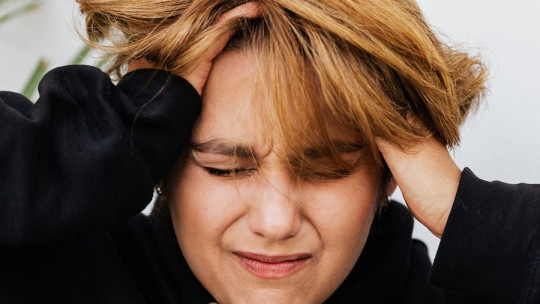
Do you usually worry about everything in an exaggerated way and feel like you can’t help it? Do catastrophic thoughts come to mind that cause you a lot of stress and worry for seemingly no reason? Do you prefer to think that the worst will happen to prepare yourself for any type of negative situation? If you have answered positively to all these questions, you are probably suffering from a generalized anxiety disorder.
Generalized anxiety disorder is an irrational, exaggerated and constant fear that causes great discomfort in the person due to excessive worry that does not allow them to carry out their daily activities and increasingly affects them in more areas of their life. These people live all or almost all the time worried that things are going to go wrong for various reasons, for example, they may fear suffering an accident when they go out in the car or walking, suffering from a serious illness and/or a loved one suffers from it.
In this PsychologyFor article about Generalized anxiety disorder: causes, symptoms and treatmentlet’s learn in more detail about this disorder.
Symptoms of generalized anxiety disorder
A person with generalized anxiety disorder may manifest it differently depending on their individual situation and personality, however, the most common symptoms of generalized anxiety disorder are the following:
- Feel irritated constantly.
- Weary Very easily.
- Have great difficulty concentrating.
- Excessive worry for the future and stop living fully in the present.
- tensions or muscle pains.
- Sleeping problems.
- Be constantly anxious and in a state of alert.
- Catastrophic thoughts constant thoughts about what could happen to oneself and/or loved ones.
- Tachycardia.
- Fear of making wrong decisions.
Causes of generalized anxiety disorder
Anyone can suffer from generalized anxiety disorder regardless of age or gender, however, it is more common in women than in men. The exact causes of this disorder are unknown, but it has been found that it may be due to different factors in constant interaction, such as, for example, physical and/or mental health, psychological and environmental factors. Let’s look at the different causes of generalized anxiety disorder:
Causes of physical health
Some of the physical health-related causes of generalized anxiety disorder include:
- Cardiovascular diseases.
- Premenstrual syndrome.
- Menopause.
- Hypothyroidism or hyperthyroidism.
- Muscle pains.
- Gastrointestinal diseases.
Psychological causes
It is common for people with generalized anxiety disorder to report that they have been very anxious for as long as they can remember. Some personality types have been shown to be more prone to developing this type of disease. Among the most common psychological causes of generalized anxiety disorder the following are found:
- Shyness.
- High degree of perfectionism.
- Low self-esteem.
- Little assertiveness: it is difficult for them to express to others what they feel for fear of doing so inappropriately).
- Indecision: it is very difficult for them to make their own decisions for fear of making mistakes since it generates a lot of anxiety for them to know that they have to take responsibility for them.
- Negative temperament: Most of the time they have negative thoughts towards everything or almost everything that happens to them.
- Constant sadness: They have a rather sad temperament due to the negative perception they have about their life.
- Low tolerance for uncertainty. In this article, we tell you how to manage uncertainty.
Environmental causes
There are some environmental factors that can contribute to a person being more likely to develop this disorder. Some of these factors that cause generalized anxiety disorder are:
- It frequently occurs in people without work.
- childhood trauma: sexual abuse, physical and/or psychological abuse, abandonment or death of one or both parents, bullying, among others.
- Have anxious parents: so since they were little they have learned to have this type of behavior.
- Having experienced or continually experiencing stressful situations.
Mental health causes
It has been found that people who have a chemical imbalance in brain activity can present generalized anxiety disorder. For example, not enough neurotransmitters are produced in the brain, such as norepinephrine, dopamine and serotonin, and/or some areas of the brain responsible for controlling emotions and behavior are too active.
In this article you will find tips on how to manage emotions.

Psychological treatment for generalized anxiety disorder
How is generalized anxiety disorder cured? It should be treated mainly with psychotherapy, however, depending on the individual situation, it can also be combined with pharmacological treatment.
On the one hand, psychological treatment is aimed at reduce anxiety symptoms and to reduce the disability caused by it. Depending on the patient’s difficulties, work will be done on one or more areas of their life that have been affected by suffering from this disorder.
What is generally worked on in therapy is to provide the person with all the information related to the disorder they suffer from, since most of the time they do not know what it is about or that they are suffering from this disorder. I also know analyze the factors that cause and maintain anxiety levels. In this article you will see the different types of psychotherapy that exist.
On the other hand, the person is taught relaxation exercises To reduce anxiety, you work with your own thoughts to help you prevent worrying behaviors, you are taught assertiveness and problem-solving techniques, as well as some social skills. Finally, the person is exposed in imagination and in real life so that they can face the feared situations.
Drug treatment for generalized anxiety disorder
How to treat generalized anxiety disorder? The pharmacological treatment relieves symptoms of anxiety and/or depression that the person may present, as well as to prevent relapses. Typically, the medications given to cure generalized anxiety disorder are the following:
- Anxiolytics: They help the person feel calmer and not become exaggeratedly distressed by any situation. Some examples are bromazepam, eldiazepam or lorazepam, among others.
- Antidepressants: It is common that people with this type of condition may present some type of depression.
It is important to take into account that the professional indicated to prescribe the medications must be a psychiatrist. The psychiatrist is the one who will evaluate in detail the individual situation of each person, because it will not be the same for everyone. It may be that for some the consumption of certain drugs has the desired effect and for others it may be the opposite. It must also be remembered that Drugs alone will not eliminate the problem and they must always be combined with psychological treatment.

Mindfulness or meditation
People with generalized anxiety disorder often stop experiencing the present, what they are experiencing here and now, to focus only on the future. They live worried about what may or may not happen and ignore what is really happening, which causes their anxiety levels to increase significantly.
How to relieve dizziness due to anxiety? The mindfulness or meditation techniques They are very beneficial for this type of condition, since they help us focus on the present moment and put aside worries about what has not happened. It helps us learn to enjoy every moment we are experiencing and improves our relationship with our environment and the people around us.
In the following PsychologyFor article, we talk about the different types of meditation and their benefits.
This article is merely informative, at PsychologyFor we do not have the power to make a diagnosis or recommend a treatment. We invite you to go to a psychologist to treat your particular case.
If you want to read more articles similar to Generalized anxiety disorder: causes, symptoms and treatment we recommend that you enter our Clinical Psychology category.
Bibliography
- American Psychiatric Association. (2014). Diagnostic and Statistical Manual of Mental Disorders. DSM 5. 5th Edition. USA: Panamericana.
- Butler, G. (1991). Anxiety management. Government of Navarra, Department of Health.
- Moreno, P., & Gutiérrez, A. (2011). Anxiety guide. Moreno Clinic Psychologists, Clinical Psychologists.








